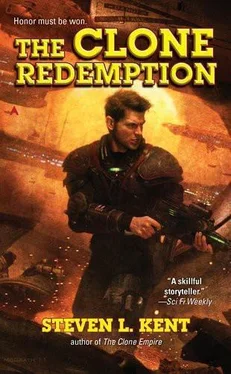Steven Kent - The Clone Redemption
Здесь есть возможность читать онлайн «Steven Kent - The Clone Redemption» весь текст электронной книги совершенно бесплатно (целиком полную версию без сокращений). В некоторых случаях можно слушать аудио, скачать через торрент в формате fb2 и присутствует краткое содержание. Жанр: Боевая фантастика, на английском языке. Описание произведения, (предисловие) а так же отзывы посетителей доступны на портале библиотеки ЛибКат.
- Название:The Clone Redemption
- Автор:
- Жанр:
- Год:неизвестен
- ISBN:нет данных
- Рейтинг книги:4 / 5. Голосов: 1
-
Избранное:Добавить в избранное
- Отзывы:
-
Ваша оценка:
- 80
- 1
- 2
- 3
- 4
- 5
The Clone Redemption: краткое содержание, описание и аннотация
Предлагаем к чтению аннотацию, описание, краткое содержание или предисловие (зависит от того, что написал сам автор книги «The Clone Redemption»). Если вы не нашли необходимую информацию о книге — напишите в комментариях, мы постараемся отыскать её.
The Clone Redemption — читать онлайн бесплатно полную книгу (весь текст) целиком
Ниже представлен текст книги, разбитый по страницам. Система сохранения места последней прочитанной страницы, позволяет с удобством читать онлайн бесплатно книгу «The Clone Redemption», без необходимости каждый раз заново искать на чём Вы остановились. Поставьте закладку, и сможете в любой момент перейти на страницу, на которой закончили чтение.
Интервал:
Закладка:
“I would recommend against that, sir,” he said. “We haven’t repaired the oxygen generator.”
“That could be a problem,” I said. I’d known the engineers hadn’t run the air yet when Mars said I needed armor to tour the ship, but I’d thought he’d have it up and running by the time we began the mission. “What if someone needs to use the head?” I asked.
“Probably not a good idea, General. We haven’t restored power to the toilets, either.
“You wanted a self-broadcasting spy ship with working stealth engines, sir, not a luxury cruiser. Getting the broadcast and stealth gear running was miracle enough.”
Realizing that the only things holding the ship together were chewing gum and Scott Mars’s faith in God, I decided to cut the inspection short. I knew what I needed to know—that the ship was flying, and she had a working stealth generator. I did not want to know the rest.
I returned to the bridge as Don Cutter prepared for the inaugural broadcast. With the Churchill out of commission, he had nothing better to do than to risk his life helping me.
“Feeling lucky?” he asked, as I entered the bridge. He and his three-man bridge crew wore the soft armor used by technicians and engineers.
“Mars says the ship is fine,” I said.
“With all due respect, sir, that’s bullshit. The engines work and the holes are plugged, but this ship is several miles south of fine.”
“Just get us out there,” I said.
“Yes, sir,” said Cutter. “You should probably use the tint shields in your visor, sir.”
Larger ships such as battleships and carriers did not have viewports at the front of their bridges. They had display screens, which they shut off during broadcasts. Cruisers and frigates had actual honest-to-goodness viewports. If the people in the bridge did not shield their eyes during broadcasts, they’d most likely go blind.
The tint shields in my visor normally came on automatically; but a quick glimpse of the glare from the anomaly could do a great deal of damage if you looked into it before your shields kicked in. Using optical commands, I initiated the shields. The only problem was that in the moments before the broadcast, the shields left me blind.
Then the broadcast began. Even through the blackness of my tint shields, I could see the anomaly, its thick tendrils of electricity wrapping like ivy around the hull of the ship. I should have looked away from the viewport, but I was mesmerized. To me, the anomaly was like a passageway to death, and death fascinated me.
And then I saw nothing. We had completed the broadcast and left the anomaly to fade behind us. I deactivated the tint shields, and there was Mars—the planet—a tawny-colored globe in a solitary orbit. We had broadcasted in only ten thousand miles off the surface of Mars, on the side of the planet facing away from Earth and the sun. Our ship was small and designed to create a diminished anomaly. Unless they were looking for us, or a ship happened to be passing nearby, no one would notice the anomaly. The Unifieds did not know we had stolen their self-broadcasting ship. As far as they knew, we needed a network for pangalactic travel.
Our stealth generator purring like a newborn, we circled Mars. The planet was dark and still below us. It only took a minute to locate the barges. They sat unguarded and alone.
Everything had gone according to plan so far.
CHAPTER NINETEEN
I entered Landing Bay One, which was dark as death and silent.
The night-for-day lenses in my visor lit the scene well enough. The landing-bay floor was enormous and packed tight with seven transports. Parked with their rear hatches open, the heavy birds sat so close together that their stubby wings interlocked like a cog. I had to walk along the outer wall of the landing bay to get to my ride; the space between the ships was too tight.
The men in my company had already boarded the transports. I expected to find them swarming the deck like ants at a picnic; but there was no room on the deck, so they huddled in the kettles, readying for war. If I listened in over the interLink, I would hear some of the men muttering final prayers and others swapping jokes, the more profane the better. Some men faced death in quiet meditation; some tried to hide their fear from everyone, especially themselves.
A few of the boys gave in to the dangerous temptation of rechecking their weapons. Marines clean and load their weapons the day before the mission, when they are calm. There’s always a temptation to distract yourself by stripping and cleaning your piece on the way to battle, but nervous men tend to speck up. Guns that worked perfectly sometimes jammed when stripped and assembled right before battle. Equipment that was safely packed sometimes fell out of your go-pack if you tried to reorganize on the way to the battlefield.
The spy ship was still a few minutes from the barges but closing in quickly when I entered the lead transport. The sailor coordinating the mission gave the signal, and our pilot sealed the rear hatch and prepared to launch.
A sled towed the transport through the flight tube, past disabled atmospheric locks. We did not launch when we reached the end of the runway. Our transports weren’t cloaked. Once they launched, the Unifieds would spot them, and the countdown would begin. Instead of leaving our transports lined up on the deck, Flight Control lined us up in the tube. As each bird left the ship, the next one would follow on her tail.
Along with a company of Marines, our transport carried a team of three sailors. Once we secured the barge, it would fall upon these men to pilot her out. I hoped they were up to the challenge. We had no intel about what we might find inside the barges. For all we knew, they worked off brain waves or fart commands.
As I waited in the kettle, a Marine approached me and saluted. He said, “General Harris, sir, the other transports are in place.” My visor read his identity from a chip in his visor and labeled him Major Hunter Ritz.
I returned his salute. “Ritz,” I said. “Didn’t you serve on Terraneau?”
“Yes, sir. From the beginning, sir,” he said. “I went down with you and Hollingsworth when you liberated the planet.”
He couldn’t see through the visor of my helmet, but a smile worked its way across my lips. Not many men had survived that battle. “And now you’re a company commander?” I asked.
“Yes, sir,” he said.
I was glad to have a battle-tested Marine in my ranks, a man who would not lose control if things headed south.
“I’m going up to the cockpit,” I said.
“Aye, sir,” Ritz said.
Heading into this battle, he was all spit and polish, but I remembered Ritz on Terraneau. He stumbled into a dormitory filled with orphaned girls and referred to it as a harem. Spit and polish were the last fluids on his mind that day.
Those were the same girls Ava had taught in her classes. They were all dust now. Everyone remaining on Terraneau was dust.
The sea of men parted for me as I crossed the kettle. I climbed the ladder, walked the tight catwalk, and entered the cockpit.
My pilot was Lieutenant Christian Nobles, the Marine I had adopted as my private pilot. He wore combat armor. Once all the transports were docked, he would join in the fight. On missions like this, every man joined in the fighting …everyone but the sailors we brought to fly the barges. Marines are interchangeable parts. Flight crews are not.
We traded salutes, and I sat in the copilot’s chair. I sighed, and said, “Once more into the breach.”
Nobles said, “I saved your seat for you, sir; but I wasn’t sure you were coming. I thought maybe you forgot about me.”
Maybe Nobles thought I was invincible. He never complained when I dragged him into deadly situations. If he thought my invincibility would protect him as well, he’d never looked at my record and had no idea how many friends had died around me. If he’d known, he might not have been so confident.
Читать дальшеИнтервал:
Закладка:
Похожие книги на «The Clone Redemption»
Представляем Вашему вниманию похожие книги на «The Clone Redemption» списком для выбора. Мы отобрали схожую по названию и смыслу литературу в надежде предоставить читателям больше вариантов отыскать новые, интересные, ещё непрочитанные произведения.
Обсуждение, отзывы о книге «The Clone Redemption» и просто собственные мнения читателей. Оставьте ваши комментарии, напишите, что Вы думаете о произведении, его смысле или главных героях. Укажите что конкретно понравилось, а что нет, и почему Вы так считаете.












